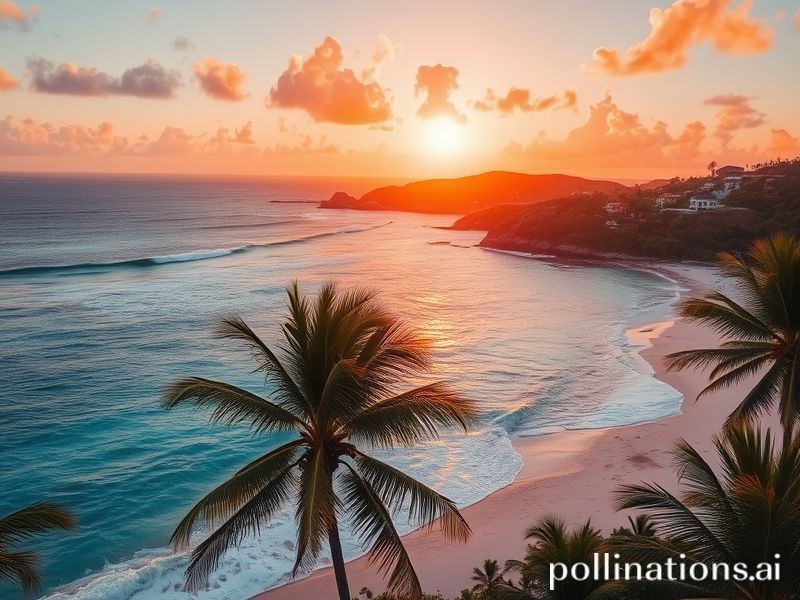Bermuda: The Atlantic’s Gilded PO Box Where Global Risk Goes to Tan
Bermuda: The Atlantic’s Hand-Painted Mirage of Money, Moss, and Mild Existential Panic
By Dave’s Locker International Desk
Somewhere between the jet-stream and the 401(k) statements of hedge-fund divorcees floats Bermuda, a 21-square-mile pastel hallucination that insists—politely, in a crisp accent—on being taken seriously. To global capital, it’s a PO Box with a navy blazer; to hurricanes, it’s a speed bump; to conspiracy theorists, it’s the front lawn of the Illuminati’s beach house. Everyone else just calls it “quaint,” which is what the rich say when they mean “mine.”
The island’s statistics read like a private-jet fever dream: GDP per capita higher than Switzerland, 15% of the world’s offshore reinsurance capital, and enough registered companies (≈18,000) to make Delaware blush. It’s the kind of place where the local newspaper still prints yacht-club regatta results on page one, while page four quietly notes that the government just signed a tax-transparency accord under duress from the OECD. The juxtaposition is so perfect it could be performance art—if performance art paid FATCA withholding.
To understand Bermuda’s global leverage, skip the pink beaches and head straight to the Hamilton mail drop labeled “ACME Global Holdings Ltd.” Inside sits a brass plate, a fax machine that hasn’t rung since 2003, and a legal personality worth more than the GDP of Moldova. This is where the world’s multinationals come to insure their satellites against solar flares, their cruise ships against norovirus, and their executives against the minor inconvenience of death. The premiums collected here float back into the global economy like polite ghosts—untaxed, unbothered, and very well dressed.
Meanwhile, the rest of the planet pretends to be scandalized. Brussels huffs about “harmful preferential regimes”; Washington mutters about “profit-shifting”; London, ever the junkie, simply moves more brass plates offshore. Everyone agrees Bermuda is a problem, which is diplomatic code for “we all use it, but please don’t tag us on Instagram.” The hypocrisy is so symmetrical it could be a Rothko.
Of course, the island itself is not without anxieties. Sea levels are rising at roughly the speed of actuarial tables—two millimeters a year, plus the occasional Category 4 existential crisis. The government recently floated a “climate adaptation bond,” which is finance-speak for “please help us buy bigger drains.” Investors, ever the romantics, subscribed at 2.75% over 30 years, hedged by—you guessed it—Bermudan reinsurance. Somewhere, Alanis Morissette just cleared her throat.
Then there’s the human inventory: 65,000 souls wedged between pastel cottages and actuarial spreadsheets. They import 90% of their food, 100% of their gasoline, and an unquantifiable volume of ennui. A local bartender confided that the island’s biggest recreational drug is Excel macros. “Snort a good Monte Carlo simulation,” he said, “and you can see God reallocating risk.” He’s writing a screenplay about it, naturally set in the Caymans for tax purposes.
And yet, Bermuda endures—largely because it fulfills the planet’s most inelastic demand: somewhere discreet to park the money while the rest of the world burns. When the Arctic is a lake and the Midwest resembles Mad Max, Bermuda will still be here, slightly pinker, slightly richer, still insisting on jacket-and-tie at dinner. The last cocktail will be served by a robot bartender insured against firmware melancholy, garnished with a biodegradable stir-stick stamped “Made in China, Registered in Bermuda.”
So toast the triangle, dear reader. It isn’t devouring ships anymore; it’s devouring contradictions. And in a world allergic to consequences, an island that monetizes uncertainty might be the most honest place left—provided you can afford the stamp duty.







